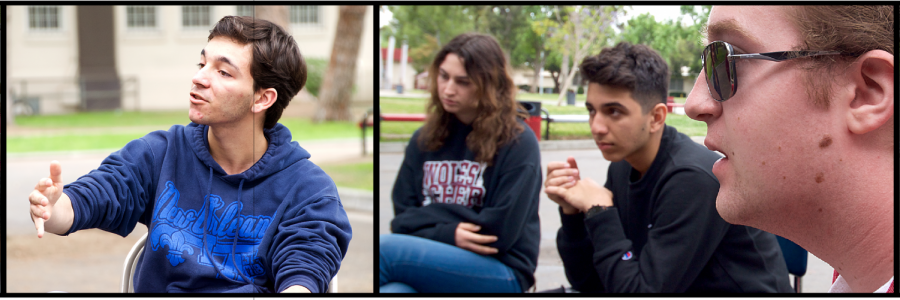An Uncertain World
More stories from Jack Beckman-Smith
Students discuss foreign affairs (L to R): David Akcheirlian, Meelod Semsarha, Anna Pfau, Oshree Barak.
From pulling out of the Iran Deal to cancelling the Summit meeting with North Korea, President Trump’s political actions have produced a varied uproar in America — and the students of Van Nuys have something to say about that.
What matters most to The Mirror is our audience, and what our audience thinks. So, on May 24 The Mirror brought together a group of students from Van Nuys to have an open discussion about foreign policy issues that the U.S. is involved in, that are important on the global scale. This consisted of the Iran deal, the Israeli-Palestinian conflict, the Syrian Civil War, and Korean relations.
The discussion opened with the Iran deal, and many students’ opinions were already set in stone.
“I actually have a very positive view on the establishment of the deal. Obama knew he couldn’t just make a deal in which Iran would agree to stop their nuclear program completely,” said 11th grader David Akcherlian. “The goal of the deal was to postpone that period in which he knew he could restrict Iran’s abilities until relationships advance.”
Picking up where Akcherlian left off, 12th grader Ivan Nathan responded, “He (President Trump) didn’t find it fair and I find that silly. As you said, it’s a stepping stone, it’s the next step towards progress.”
As the conversation progressed, the students discussed various topics from human rights violations to the effects of imposing sanctions.
“We don’t help the people, we are hurting them, we think they will choke out the government officials but instead they use that as a rallying cry to hate us more,” Nathan rebuked about the use of economically constricting sanctions on Iran.
The discussion transitioned to how people across the world viewed the US and how decades of foreign policy decisions has made the nation look like the “bad cop” of the world.
Junior Sharmie Azurel brought up an important question about America’s involvement in foreign affairs, “What’s more important, human rights value or economic and diplomatic power?”
The conversation regarding Iran concluded with a fairly general consensus: the United States and its allies played a role in creating the problems in Iran — and the deal was a tiny step towards the right direction.
Moving past the hot button topic of Iran, the group began to discuss the issue of the Koreas. Most of the students agreed that although it’s a coveted goal, reunification between North and South Korea is unlikely to happen.
“The North Koreans feel that they are using the nuclear weapons as protection. They don’t want to be invaded,” said Senior Kavi Suri. “It’s sort of like a barrier from anything attacking them.”
Nathan added on that North Korea does not actually want to nuke the South Koreans. Both parties think “…neither side is bad, they’re just troubled brothers.”
The notion of nuclear armament was rationalized by Nathan and Akcherlian, with both agreeing that North Korea’s desire to maintain a nuclear arsenal is merely out of fear for what the US did to nations like Libya, where they toppled their regimes.
These small countries, the ones that are also the most vulnerable to the world’s superpowers, became the focus of the conversation. The students began to compare and contrast the US and China in their ways of handling developing nations.
Nathan contrasts the aid-focused mentality of the United States with the investment-focused mentality of China. The group discussed how aid from the United States only impacts African business by leading to more economic stagnation. On the contrary, China has been investing in the infrastructure of developing nations, emboldening the economies of these struggling countries.
The students all laughed, trying to recall the parable about the man and the fish. 11th grader Oshree Barack finally recalled, “Give a man a fish and he’ll eat for a day, but teach a man to fish and he will eat forever.”
The discussion transitioned back to the Middle East, where students began conversing about the highly controversial region of the Levant.
Very briefly touching on Syria, some students proposed they don’t think Assad was responsible for the two chemical weapons attacks in Syria, and that the regime in charge of Syria’s government wouldn’t want to sabotage their impending victory in the civil war.
Akcherlian criticized America’s handling of the situation, saying our immediate condemnation of the Assad regime was rash and unfounded. “We seem like a big elephant walking on mouse traps, we aren’t paying attention,” Akcherlian disgruntledly said.
The discussion closed out with final thoughts on both Trump and Palestine.
Barack chided, “I agree that putting a label on Jerusalem as the capital gave Israel’s government validation. I’m pro two-state resolution as well and I learned that they are limiting rights of Palestinians and that is so messed up. I wish we could look more into that and do something about it because Israel is supposed to be the land of the Jews who have been oppressed throughout history and now we are oppressing Palestinians, it is just hypocritical.”
The students finally began to wrap up their long and informed discussion. “I was very pro-Trump before he became president,” said Akcherlian. “I was very attracted to his promises of pulling out of the middle east and NATO, of doing all these things that he’s doing the exact opposite of now.”
Your donation will support the student journalists of Van Nuys Senior High School. Your contribution will allow us to purchase equipment and cover our annual website hosting costs.


